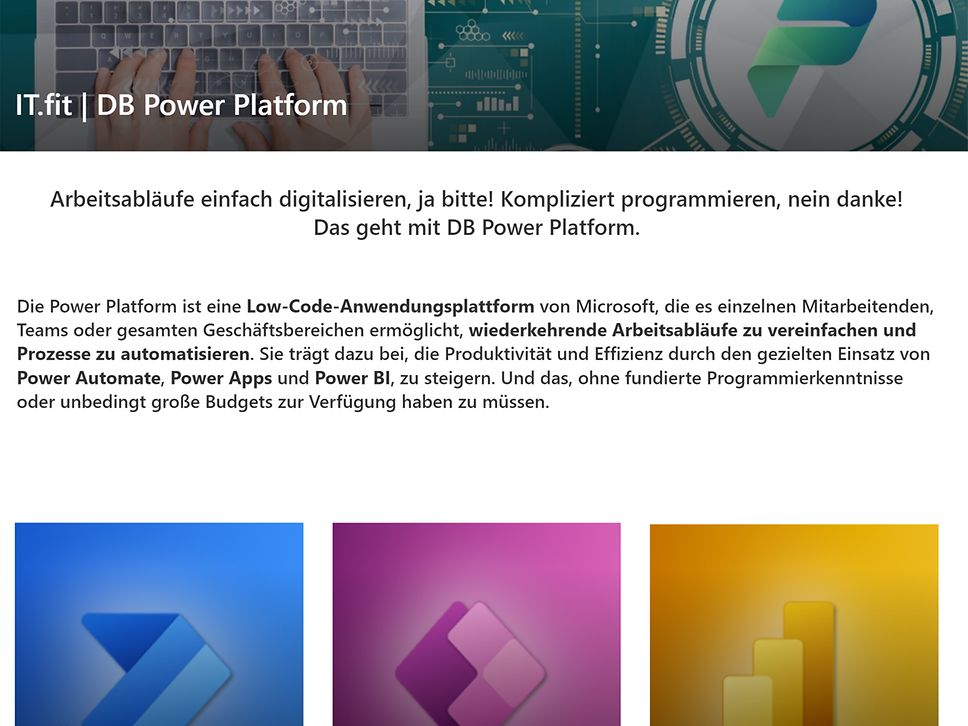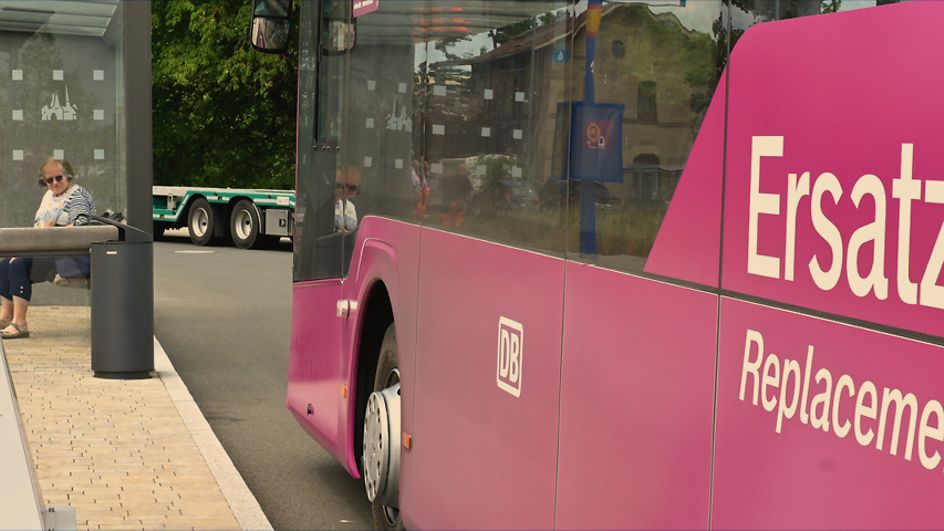Citizen Development at Deutsche Bahn
Article: IT toolbox enables 250,000 DB employees to develop their own apps
09/2024 – What happens when you give tens of thousands of employees simple tools with which to create their own IT applications? You create space for almost infinite ideas to make the working day easier. The rollout of these new tools was supported by DB Systel.
Since 2023, around 250,000 Deutsche Bahn employees, without professional software development expertise, have been able to create new apps independently and automate processes. Everyone in the Group who has access to Microsoft 365 can now design their own apps and software tools. And it's all thanks to Microsoft Power Platform. "There is comprehensive licensing for all employees," says Gerrit Müller, who manages Microsoft 365 Services in the CIO team at Deutsche Bahn.
Automating and creating apps at the touch of a button
Deutsche Bahn employees simply visit the platform's homepage at make.powerapps.com, where they can learn, browse or get started right away. "I have already automated multiple tasks for myself and my team," reports Gerrit Müller. "For example, I no longer forget to send a reminder on Mondays to enter something in the agenda list by Wednesday, because it happens automatically." Joachim Heß and his DB Systel team managed the rollout of the Power Platform: "There are so many features that are suddenly available. The Power Platform opens up a world of possibilities."
What is low-code/no-code development?
Low-code/no-code development (LCNC development) is a new approach to software development that allows anyone to create applications without having to write code. Visual user interfaces and modelling tools are used to create applications with minimal manual programming effort. There are customisable templates, predefined components and intuitive services that can be used to create applications quickly and efficiently using drag and drop.
The platform is essentially a toolbox that makes almost all the functions and data from Deutsche Bahn's Microsoft ecosystem easily accessible. With Power Automate, employees can create workflows to automate repetitive tasks and business processes. And with Power Apps, employees can build custom business applications. There is also a separate Business Intelligence category, featuring preconfigured functions and logic, which allows employees to transform raw data into easy-to-digest insights for the organisation.
"Low code/no code is a tool that we can use to improve digitalisation in smaller and larger corporate departments within the Group. Or even to move from an analogue mechanism to a digital process."

Individual departments can create official tools
At their simplest, such IT tools can be used for the automatic saving of e-mail attachments, for triggering notifications or for small or large apps for planning and inventory. Christoph Schmitz from DB InfraGo used the toolbox to develop an app that makes it much easier for colleagues to document the installation of track monitoring targets on the rail line. Stephanie Schneider from DB Services has digitised the shift logbook for the Vehicle Cleaning division. It now records cleaning services in an app instead of on a paper slip and automatically sends the information to the configured distribution groups and customers.
Making software development accessible to everyone is also known as citizen development. As Joachim Heß from DB Systel explains, "The ultimate aim is for the individual business units to take ownership of their own information technology." It is not about making digitalisation the responsibility of everyone, but about helping to improve the little things in day-to-day work. Some everyday requirements in business units may be too small to become an IT project:
"In such cases, it would not be unusual to turn to Excel for a solution," reports Joachim Heß. "And suddenly Excel became indispensable in some places, which nobody really wants." Now departments can replace such makeshift solutions with official tools. "The Power Platform has made it possible for everyone to work on a professional platform to produce applications with targeted support. And thanks to the interfaces offered by the Power Platform, a deployable rights and role concept, a better user experience, improved performance and much more besides, these applications have clear advantages over a rather dated Excel construct."
"Low code was in use at the DB Group even before the Power Platform," recalls Joachim Heß. "We have various technologies that use low code in the traditional way. Traditional in the sense that a business unit has technical requirements, which are then implemented by the IT department with the aid of low code. Low code means pre-built, reusable components and modules on a platform, which can be customised according to individual requirements. The downside of this traditional approach is the potential for misunderstanding because business units do not appreciate the technological limitations and IT do not understand the technical requirements."
Getting the departments up to speed
The idea of individual departments being responsible for their own software development is new. In this project, it was particularly important to everyone involved to make it as easy as possible for the business units to get started with low-code development. As Gerrit Müller explains, "The question was, how can we harness the potential and motivate those new to development who have good ideas?" The platform and functions were supplied by the strategic Microsoft IT partner ready for use. The focus of the project was therefore on creating accompanying instructions and guidelines and, above all, providing inspiration and motivation.
Overview of the DB Power Platform (only available in German)
Before releasing the Power Platform to employees, the Group IT department worked with DB Systel to establish a framework for the new IT toolkit at Deutsche Bahn: "We had a nine-month implementation project in which we set up the processes in the background to ensure straightforward compliance with the governance, codetermination and data protection requirements for employees and verification of this compliance." Another key aspect was the sharing of knowledge and examples. An internal community was to be created from the outset, allowing employees to share their results with other teams as templates or ready-made tools. The DB Systel team also provided application templates with the Deutsche Bahn corporate design right from the start.
Revolutionary low-code development and smart application shells
Another result of the preliminary work is the application PALM, which runs in the background to make sure that the apps and processes created adhere to corporate guidelines and cannot break anything. This is because Power Apps and independently developed business intelligence tools could also feed back business data. The independently created applications are intended for the employees themselves or their team. They are based exclusively in the Microsoft 365 ecosystem. Low-code development with professional support from DB Systel is still an option today (link available for DB employees). This is recommended for applications that are intended for a wider range of users, for example, or that require additional data, authorisations or interfaces.
The platform offers business units the opportunity to reuse existing elements: "We used to call this an application shell. If I have an app that manages the inventory of PCs, for instance, then there are attributes such as 'this is the size of the solid state drive, this is the size of the screen'. It's the same with a wheelset that's in storage," says Joachim Heß. "It has a certain weight, it has a certain size, it fits certain train categories. I can therefore repurpose this application shell for another area without having to set it up as a new IT project."
"It's a paradigm shift: how do you establish IT in the business units and at the same time share the developments and experience gained with everyone in the Group? We want to strengthen the mindset of 'This solution we have developed can certainly be used elsewhere in the Group' And that is exactly what we have made possible here!"

Training for interested employees
"Since the launch, we have slowly been learning how the community works. Have the requirements been set correctly? Are the safeguards right?" says Gerrit Müller. "Not a month goes by without us optimising something." One of the most important challenges remains improving internal awareness of the platform: "We would have liked more people to be actively using it than currently are," says Joachim Heß "On the other hand, we are realising that this community continues to grow and many creative applications have already been developed."
This internal platform community already has thousands of active members: "But the potential is much, much greater," concludes Gerrit Müller. "There are many people who ask themselves: can I do this? Am I going to break something?" Training is therefore essential. In an initial training initiative, 2,100 training places were fully booked after just seven hours, and additional places were also allocated within minutes. Preparations are currently underway for another, even bigger series of training courses, which will enable even more curious people to become new citizen developers at Deutsche Bahn.



